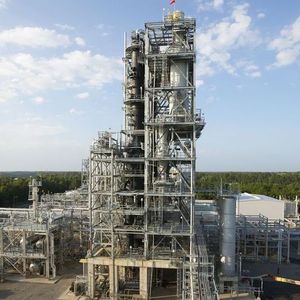REG acquires various KiOR plant assets for $1.5 million

Photo: KiOR
October 6, 2015
BY Ron Kotrba
Renewable Energy Group Inc. announced Oct. 6 that one of its subsidiaries, REG Synthetic Fuels LLC, has received approval from a Mississippi court to purchase certain equipment at the KiOR Columbus LLC production facility in Mississippi. KiOR filed for bankruptcy late last year. Its facility was scaled at 15 MMgy to produce cellulosic diesel and gasoline from woody biomass, specifically Southern Yellow Pine.
Under the approved asset purchase agreement, REG Synthetic Fuels paid $1.5 million, plus certain expenses related to equipment preparation, to acquire various physical assets from KiOR’s Columbus plant, including a 12-million gallon hydrotreating unit, distillation column and tankage.
“These are quality assets we were able to purchase for a very good value,” said Brad Albin, vice president of manufacturing for REG. “We plan to relocate and utilize the equipment for future advanced biofuel or renewable chemical projects.”
Advertisement
Advertisement
Advertisement
Advertisement
Related Stories
Marathon Petroleum Corp. on Aug. 5 released second quarter financial results, reporting improved EBITDA for its renewable diesel segment. The company primarily attributed the improvement to increased utilization and higher margins.
Chevron Corp. on Aug. 1 confirmed the company started production at the Geismar renewable diesel plant in Louisiana during the second quarter after completing work to expand plant capacity from 7,000 to 22,000 barrels per day.
The public comment period on the U.S. EPA’s proposed rule to set 2026 and 2027 RFS RVOs and revise RFS regulations closed Aug. 8. Biofuel groups have largely expressed support for the proposal but also outlined several ways to improve the rulemaking.
In celebration of World Biodiesel Day, MOL Group on Aug. 8 announced SAF was successfully produced for the first time at INA’s Rijeka Refinery during a pilot project to process biocomponent. Renewable diesel was also produced.
Iowa farmers have a new market opportunity for their 2025 soybean crop. Landus is expanding its Clean Fuel Regulation initiative, made possible by recent policy changes expected to increase Canada's demand for liquid biofuel.
Upcoming Events










